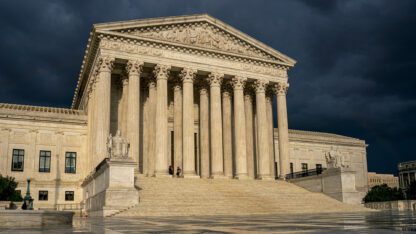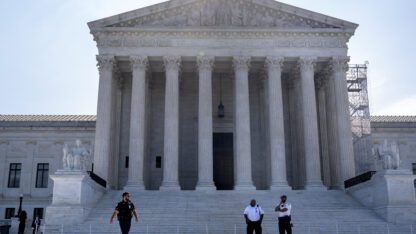All 50 states would suddenly have the power to decide when and if abortion should be legal if the U.S. Supreme Court overturns Roe v. Wade, but that won’t just be a question for lawmakers.
State courts, attorneys general and even district attorneys would be thrust onto the frontlines of this debate. Who holds those offices will matter.
In Michigan, Democratic Attorney General Dana Nessel called a 90-year-old abortion ban still on the books, “draconian” – and promised not to enforce it.
In Georgia, Jen Jordan, a Democratic candidate for attorney general, said she’d challenge a restrictive abortion law in state courts.
“They told us this road is cut off, where do we go next? Where we go next is the Georgia Constitution,” Jordan says.
As news of the draft ruling spread, Democratic attorneys general, governors and state legislators pledged to fight back, highlighting the stakes of their races in the 2022 midterm elections, hoping abortion rights could motivate voters.
How much leeway do attorneys generals have?
Former Maine Attorney General James Tierney knows a thing or two about the job. He has been a go-to adviser for state attorneys general and teaches a class on them at Harvard Law School. He says some people even call him the “fifty-first attorney general.”
Tierney says attorneys general have immense discretion. They can choose to challenge a restrictive abortion law in court – or defend it.
“It’s always important who sits in the attorney general’s office. Always. Not just political party but what they argue, how they argue,” Tierney says. “Does who sits in the AG’s office end the story? And the answer is clearly no.”
In many states, abortion could carry criminal penalties. What attorneys general typically can’t do is decide whether or not to enforce them.
In some states, district attorneys have sole responsibility for criminal prosecutions. In other states, that authority is shared with the attorney general, Tierney says. And in some states, the attorney general can override a district attorney, but only if the governor intervenes.
In Georgia, it’s up to district attorneys to make that call.
District attorneys have wide discretion
Voters should be asking their district attorney to make their position clear, says Sherry Boston, the district attorney for DeKalb County, Georgia.
“I have people ask me all the time: ‘What is your position on the possession of drugs? What is your position on gun charges?’ If we can answer every single one of those questions, and we do, then there’s absolutely no reason not to answer this question about how you intend to handle abortion if it becomes criminal.”
While Boston says she would not prosecute abortion providers, patients and people who help them, district attorneys in some counties likely would. District attorneys by design have wide prosecutorial discretion.
“When I see laws that will divide people on living in the margins, based on their economic situation, based on their race, because we know access to abortion becomes more difficult for black and brown people, then it is my job to use my discretion to lessen those inherent inequalities that exist,” Boston says.
Criminal charges aside, some state constitutions may be interpreted not to allow these restrictive abortion laws at all.
A (state) constitutional question
A U.S. Supreme Court ruling overturning a federal right to abortion leaves the decision to states – and any state abortion laws would be weighed against that state’s constitution. Privacy rights are the foundation of Roe v. Wade, and Georgia’s constitution has its own strong privacy protections, which stem back to a 1905 court case brought by an artist named Paola Pavesich.
A photograph of Pavesich appeared without his permission in a life insurance advertisement in the Atlanta Constitution newspaper, says Anthony Michael Kreis, a Georgia State University law professor. Pavesich sued, and the Georgia Supreme Court ruled in his favor.
“The court put it as the right to withdraw from public gaze,” Kreis says. “Just leave me alone. And if I’m not bothering anybody, then the state should really have to produce a compelling interest in disturbing my peace.”
The courts have applied Pavesich to other legal questions, including as the basis for overturning Georgia’s anti-sodomy law.
Abortion could prove more complicated. If Roe falls and Georgia’s restrictive abortion law is allowed to take effect, the law would define an embryo as a person once cardiac activity is detected. A court could determine that an embryo’s growth overrides a pregnant person’s privacy rights.
“When you’re dealing with these amorphous terms like ‘privacy’ or ‘equality’, there’s a lot more room for people’s subjective understanding of those terms to come into effect,” Kreis says.
Kreis says these debates could boil over in lots of states, with lawmakers, courts and the public all trying to interpret their state’s laws as a 50-year-old right to abortion is overturned.









